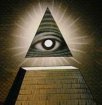The Brooklyn native manning the 8-foot-by-4-foot fiberglass and wood submarine, a replica of a 1775 model called the "Turtle," was cited by police after drifting too close to the Queen Mary 2. (NYPD)
A man in a Revolutionary War-era submarine was cited by the U.S. Coast Guard for drifting into a security zone, and for unsafe sailing in New York's East River near the Queen Mary 2 luxury liner, the Coast Guard and New York City Police Department said Friday.
The man in the replica vessel was identified as 35-year-old Philip "Duke" Riley of Brooklyn, N.Y., according to Coast Guard spokesman Petty Officer Seth Johnson.
Authorities said it was the second time Riley had floated the vessel in the vicinity of the cruise ship. The submarine, which reportedly did not have a mechanical propulsion system, was being towed by two other men in a rowboat.
"A makeshift submarine discovered at about 10:30 this morning by an NYPD Intelligence detective onboard the Queen Mary 2 in New York Harbor is the creative craft of three adventuresome individuals," NYPD Commissioner Raymond Kelly announced in an afternoon press release. "It does not pose any terrorist threat."
While Kelly said the Queen Mary 2 will be inspected to ensure the boat's integrity, and Riley and the two other men could further face NYPD charges, he chalked up the incident as a case of "marine mischief."
Riley was questioned by police after a guard on the Queen Mary 2 spotted the 8-by-4-foot fiberglass and wood submarine, a replica of a 1775 model called the "Turtle," within 200 feet of the ship. The U.S. Coast Guard also responded to the scene.
Oxygen tanks were discovered inside the vessel, but no threatening devices or materials were found onboard.
The "Turtle," invented in Connecticut by David Bushnell, was the first combat submarine designed to plant explosives on the sides of ships, according to the Encyclopedia Britannica.
A photo gallery posted July 17, 2007, on the photo-sharing Web site flickr.com titled "Adventures With an Egg" shows a "Turtle" submarine making a test run in the Red Hook section of Brooklyn, near the spot where Riley was apprehended by authorities today.
The photo slideshow also links to the Web site www.dukeriley.info, the namesake of which is described as "the man behind the madness." On that site, Riley describes himself as an "artist" and "patriot," who combines "populist myths and reinvented historical obscurities with contemporary social dilemmas."
The statement concludes, "Throughout my projects, I profile the space where water meets the land, traditionally marking the periphery of urban society, what lies beyond rigid moral constructs, a sense of danger and possibility."

No comments:
Post a Comment